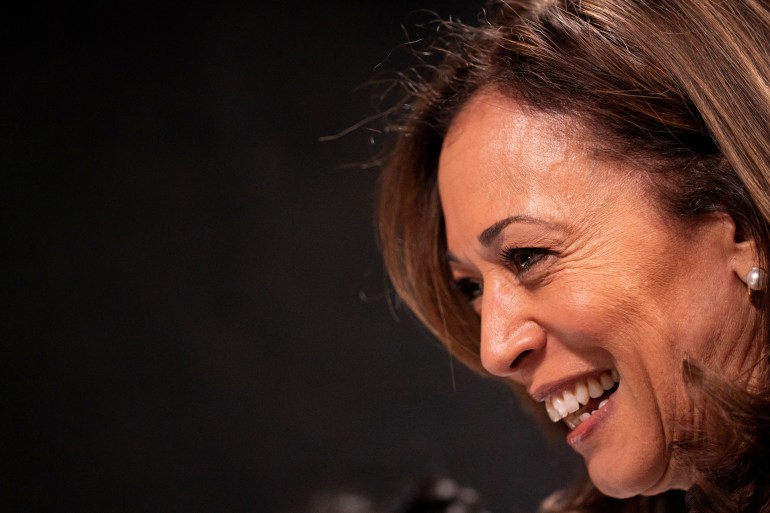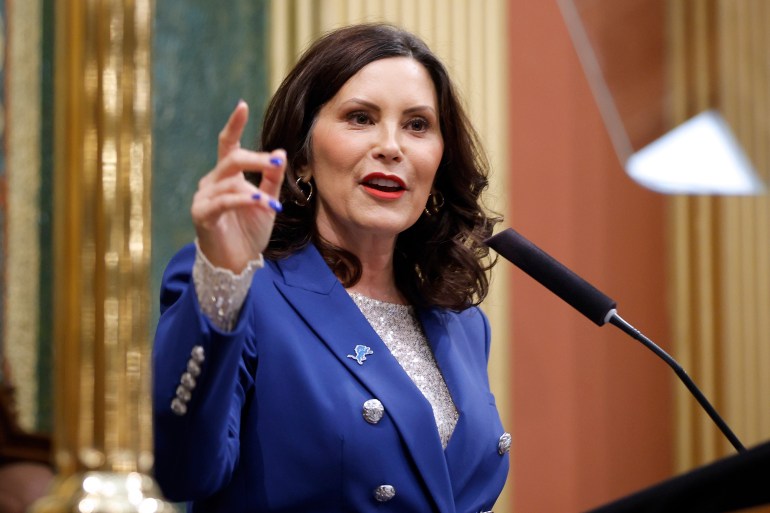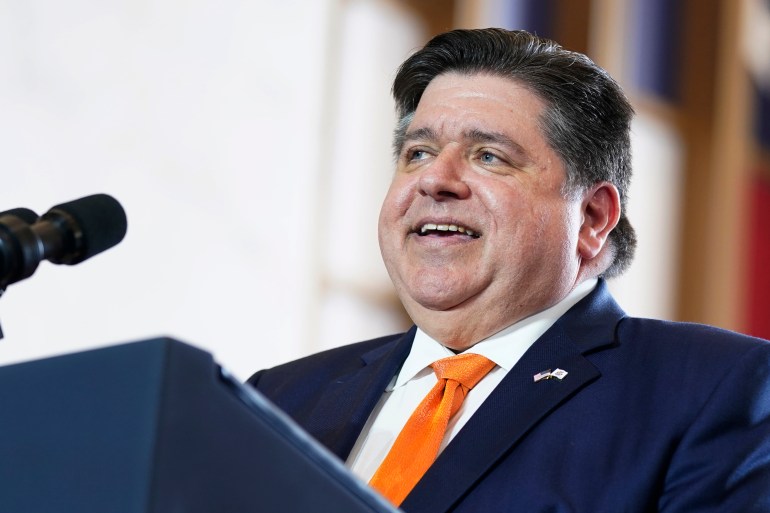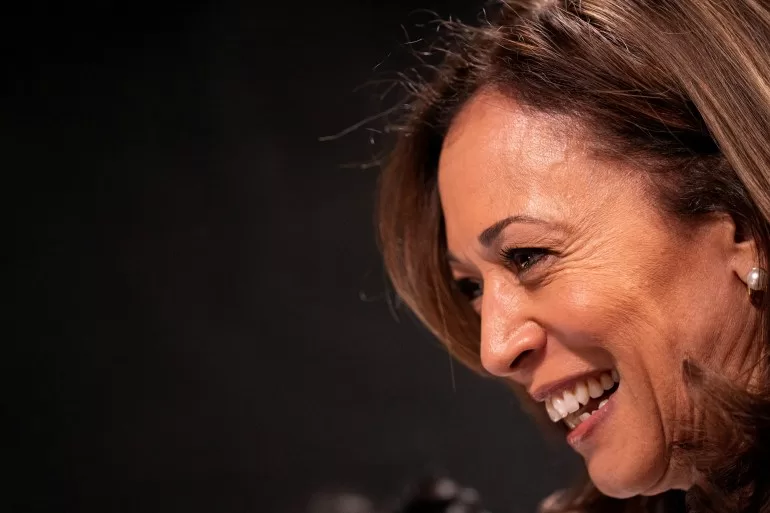It was the culmination of weeks of pressure, closed-door negotiations and public gaffes: President Joe Biden announced on Sunday that he would no longer be seeking the Democratic nomination for a second term in the White House.
But Biden’s decision has left the Democratic Party in an unprecedented position. Who will fill his shoes and face off against Republican nominee Donald Trump in November’s presidential race?
Delegates for the party are scheduled to come together on August 19 for the Democratic National Convention, where they will cast their votes for Biden’s successor.
Here, Al Jazeera breaks down some of the most likely options, their strengths and weaknesses — and identifies former contenders who have now endorsed another candidate.

Vice President Kamala Harris
Harris is Biden’s most likely heir, having served as his running mate and vice president for nearly four years.
On Sunday, Biden also formally endorsed Harris for the nomination.
But Harris has struggled to make an impact during her time at the White House. Her role, like that of many vice presidents, has been low profile, and she struggled with dismal approval ratings early in her tenure.
In 2021, for instance, a poll from USA Today and Suffolk University found that she only had 28 percent support – a number that showed her ranking lower than previous vice presidents, like Dick Cheney.
But as Biden prepared to exit the race in 2024, Harris found her star rising. A poll last week from The Associated Press news agency and the NORC Center for Public Affairs Research found that 74 percent of Democrats found her performance “favourable”.
Forty-three percent of respondents overall shared the same view of Harris.
The vice president also enjoys the support of several members of Congress, including Representative Jim Clyburn, a former Biden stalwart. “I’m going to be for Harris if Biden ain’t there,” he told USA Today earlier this month.
Originally from Oakland, California, Harris previously served as attorney general of the state and a US senator.

Michigan Governor Gretchen Whitmer
Unlike Newsom, Whitmer represents a coveted swing state in this year’s presidential election: Michigan, part of the industrial Rust Belt region.
She too has campaigned for Biden and reaffirmed her support for the beleaguered president as pressures mounted for him to end his re-election campaign.
“I am an enthusiastic supporter of President Biden, and I’m going to work my tail off to make sure he gets a second term,” she told NPR in early July after Biden’s flop debate performance.
Born and raised in the state capital of Lansing, Whitmer was elected to the state legislature multiple times and served on the Democratic National Committee before she entered the governor’s mansion.
A self-described progressive, she has also had high-profile public clashes with Trump, particularly during the COVID-19 pandemic.
Whitmer implemented a stay-at-home order at the start of the pandemic and issued restrictions on large-scale gatherings in her state. That prompted Trump, who opposed certain safety restrictions, to call her a “dictator” and denounce her on social media.
Later that same year, the Federal Bureau of Investigation (FBI) announced it had foiled a far-right attempt to kidnap Whitmer over her COVID-19 policies.
But Whitmer has rallied her state’s Democrats, helping to lead the party to a historic victory in 2022: Not only did Whitmer reclaim the governor’s mansion, but Democrats flipped both the state House and Senate.
That gave the party a “trifecta” for the first time since 1984.
Nationally, Whitmer in recent days has returned to taking on Trump. Ahead of the former president’s rally on Saturday in Michigan with his VP pick JD Vance, Whitmer put out a cheeky video reminding Trump that the state had strong abortion rights and accusing him of reneging on promises made to auto workers in Detroit.

Illinois Governor JB Pritzker
Like many on the short-list to replace Biden, Pritzker is not only a governor but also a prominent surrogate for Biden on the campaign trail, working to rally support.
While Pritzker’s home state of Illinois is a traditional Democratic stronghold, it is a key intersection for the Midwest, a region where agriculture and industry collide.
Illinois also is a stone’s throw away from key swing states like Wisconsin. Pritzker has tried to leverage his roots in the region to his – and Biden’s – advantage, pledging to build a “blue wall” across the Midwest.
“Here’s the thing that people from the coasts might not understand about Midwestern Democrats. We will be Midwest nice to you, while we Midwest beat you,” he said on the campaign trail, playing up his regional identity while slamming Trump.
A lawyer with decades of political experience, Pritzker previously co-chaired Hillary Clinton’s 2008 presidential campaign.
When he set his sights on the governor’s mansion in 2017, he invested more than $42m of his own wealth in his campaign: His family owns Hyatt Hotels and Resorts. He has since won two terms.
Pritzker is no stranger to taking on Trump, calling his far-right movement a “cancer” spreading throughout parts of the Republican Party. This month, he has made campaign stops in Indiana and Ohio, seeking to chip away at Trump’s base of support and rally Democrats.
Former contenders who have now backed Harris:
California Governor Gavin Newsom: Newsom had been one of Biden’s most visible surrogates on the campaign trail, outside of Harris herself. But while Newsom was unwavering in his support of Biden, political observers noted that he appeared to be teeing up his own future presidential bid.
Last year, for instance, Newsom travelled overseas to meet Chinese President Xi Jinping. Then, as the Republican presidential primary race started to heat up, he appeared on Fox News to debate with one of the candidates, Florida Governor Ron DeSantis.
The two-term leader of a solidly blue state, Newsom nevertheless faced a recall effort in 2021 that sought to yank him from California’s governor’s mansion. Proponents of the recall blasted Newsom for high taxes in the state and what they considered a lax attitude towards immigration. Still, Newsom handily defeated the effort, with more than 61 percent of voters rejecting the recall.
The California governor – and former mayor of San Francisco – nevertheless faces consistent criticism for his handling of the state’s homelessness crisis and widening inequality, as the cost of living rises.
Pennsylvania Governor Josh Shapiro: In 2022, when Josh Shapiro first ran for the governor’s mansion in the Rust Belt state of Pennsylvania, he received more than three million votes – setting a state record. That dominant tally is set to loom large as possible replacements for Biden are weighed.
Even Biden only earned 2.8 million votes in Pennsylvania during the last presidential election, though it was still enough for him to carry the state.
Pennsylvania is a crucial battleground for the Democrats: Like Michigan, it can tilt right or left. And Pennsylvania, the fifth largest state by population, has a whopping 19 Electoral College votes up for grabs.
Prior to winning the governorship, Shapiro served six years as the state’s attorney general, where he tackled gun violence and the opioid crisis, as well as government corruption.
Still, since taking office as governor, Shapiro has raised eyebrows – particularly among progressive Democrats – for denouncing pro-Palestinian student protesters on college campuses.
With a nod to his Jewish faith, Shapiro told the publication Politico in April: “I do feel a somewhat unique responsibility to speak out when I see this level of anti-Semitism on our campuses and in our communities.”
